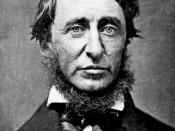This essay will be focused on the main concepts and their applications to present life of Transcendentalism, an influential movement of the XIX century, represented mainly by Ralph Waldo Emerson and Henry David Thoreau.
As a movement, Transcendentalism was essentially based on the neo Platonists ideas, the eastern mystical beliefs and the German idealist philosophy. Its focus was on consciousness, on the intuition over the matter and the intellect, on the inherent goodness of man, on individualism and self-reliance, on nature as the main proof of God's existence and on the existence of the over-soul.
Transcendentalism was a philosophy of life that influenced and encouraged the Americans, giving them the hope and the strength that they needed to establish a new country with a new perspective, free from its past governor's influence.
"(in the woods) there I feel that nothing can befall me in life-no disgrace, no calamity (leaving me my eyes), which Nature can not repair (...)
I become a transparent eyeball; I am nothing; I see all the currents of the Universal Being circulate through me; I am a part of God". In Emerson's works, specifically in Nature, nature is described as something that is attached to men, nature comforts us, it provides us food and work and everything that we need, it is the prove that God exists not only as the ruler of the world, but as men's creator and father. Emerson philosophy had great influence of Unitarism, his view of man was very optimistic, he believed that men are God's sons and Jesus' brothers and for this reason, if they listen to their internal voices and reflect about everything, they can accomplish anything.
Despite the fact of nature be our connection to God Himself, not everybody is able to really see it: "Most...



Wonderful
This is a wonderful essay, very well written and really informative. Very good arguments... it is just wonderful
1 out of 1 people found this comment useful.